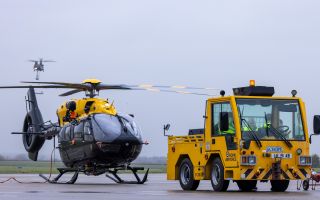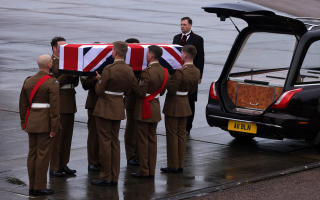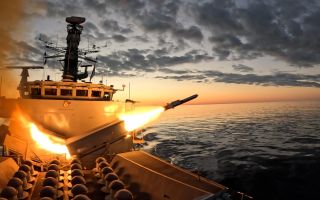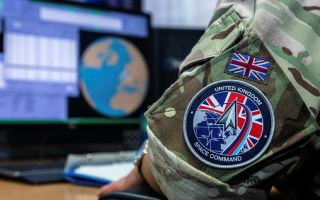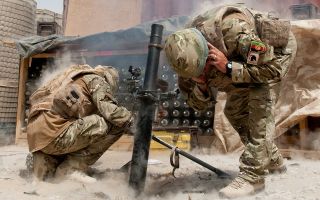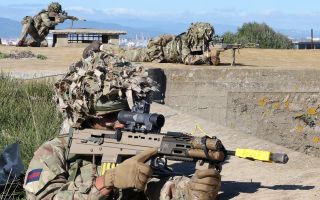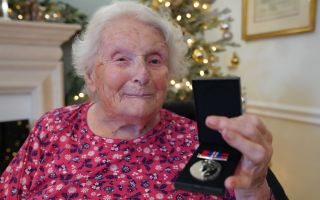750 British Troops to Combat Ebola in Sierra Leone
Britain is to deploy more than 750 military personnel to West Africa to help with the establishment of Ebola treatment centres and an Ebola training academy as part of increased efforts to prevent the global spread of the disease.
The latest deployment of British military personnel to theEbola-affected region followed a meeting of the Government's Cobra emergency committee chaired by the Prime Minister. A Number 10 spokesman said the meeting covered both the UK preparedness for potential domestic cases of Ebola and the UK's efforts to combat the disease in West Africa.
It was agreed to increase UK assistance through the deployment to Sierra Leone of aviation support ship RFA Argus to take and support three Merlin helicopters, aircrew and engineers in the region to provide crucial transport to medical teams and aid experts, involving approximately 250 personnel.
The announcement came as the first Ebola patient diagnosed in the United States, Thomas Eric Duncan, died in a Texas hospital and the World Health Organisation (WHO) warned that sporadic cases in Europe are "unavoidable".
Speaking at a joint press conference in Washington with US secretary of state John Kerry, Foreign Secretary Philip Hammond said he had joined the meeting via video link from the British embassy, where it was decided to deploy the RFA Argus, plus three Merlin helicopters "to provide a communication and transport capability on the ground".
He added: "We are also conducting trials in Sierra Leone of a new model of Ebola care unit, a primary care triaging system for those with early stage symptoms of Ebola." Mr Hammond, who last week chaired a conference in London on defeating Ebola, said: "The disease is an unprecedented threat that knows no borders. We have to get ahead of this disease, but if we get ahead of it, if we rise to the challenge, we can contain it and beat it. We know how to do this, it is not complicated to do, it just requires a large focus of resource and effort to deliver it."
He added: "We now need the wider international community to step up to the plate and deliver that additional resource, not just money, but trained medical and clinical personnel to lead that effort on the ground. We all have to do more if we are going to prevent what is currently a crisis from becoming a catastrophe."
The UK, he said, had committed more than 200 million dollars (£125m) to the programme in Sierra Leone, with military and civilian teams on the ground, plus a construction programme to deliver 700 Ebola treatment beds.
Mr Kerry said the US and UK were "standing together" battling Ebola in West Africa and paid tribute to Britain's response.
He said: "We're very grateful for the way Great Britain has now ramped up its efforts in Sierra Leone, including deploying a civil-military taskforce, constructing more than 700 beds in Ebola treatment units and providing essential supplies and personnel."
He added: "President Obama has made it crystal clear that Ebola is an urgent global crisis that demands an urgent global response."
He went on: "I am here this morning to make an urgent plea to countries in the world to step up even further, while we are making progress we are not where we can say that we need to be and there are additional needs that have to be met in order for the global community to be able to properly respond to this challenge."
Health Secretary Jeremy Hunt warned it was possible someone with Ebola could enter Britain but added the health service was prepared.
He told reporters: "Well this is clearly one of the most serious global health emergencies of recent years. Our first priority as the Government is to make sure the British people are safe. "It is now entirely possible that someone with Ebola will come to the UK by one route or another but we have very, very good plans in place. The NHS has a proven track record of dealing with and helping people with Ebola. Our ambulance services are equipped with the protective suits. But the most important thing we can do to protect the UK's population is to play our part in making sure that the disease is contained in West Africa."
At the Cobra meeting it was also agreed that more than 200 military staff would be deployed to run and staff a World Health Organisation-led Ebola training facility that will assist in the training of healthcare workers, logisticians and hygiene specialists who are needed to staff treatment units, plus 300 military personnel making up the existing UK taskforce focused on delivering support to the Sierra Leone government, a Number 10 spokesman said. Discussion focused on plans for protecting the UK against Ebola. The spokesman added: "The case of Will Pooley had demonstrated the UK's ability to deal with an identified case without wider infection, with a world-leading specialist unit at The Royal Free. Contingency planning would continue and will include a national exercise and wider resilience training to ensure the UK is fully prepared.
"The Chief Medical Officer has now issued further advice to medical professionals across the country and would continue to do so in the coming weeks. Information posters for passengers would be put up in UK airports." The Government has come under pressure to introduce screening at airports and other transport hubs to prevent the disease spreading in the UK. Authorities in Spain are dealing with the first case of the disease transmitted outside West Africa, in a hospital nurse who treated a priest flown to Madrid for treatment.
Shadow foreign secretary Douglas Alexander said the Government was right to announce a further contribution to efforts to tackle Ebola. The Labour MP said: "The Ebola virus is a clear threat to public health around the world, and it requires an urgent global response. The international community must come together in agreeing a coordinated and robust response that meets the scale of the threat that Ebola poses, and it is right that the UK plays a part in this effort. "The people of Sierra Leone are on the frontline of this epidemic, and it is right that the UK has announced a further contribution towards the urgent international efforts to tackle the spread of the virus there. The UK's commitment to help build a treatment unit for healthcare workers, as well as further hospital facilities, will help the authorities in Sierra Leone respond to the outbreak."

